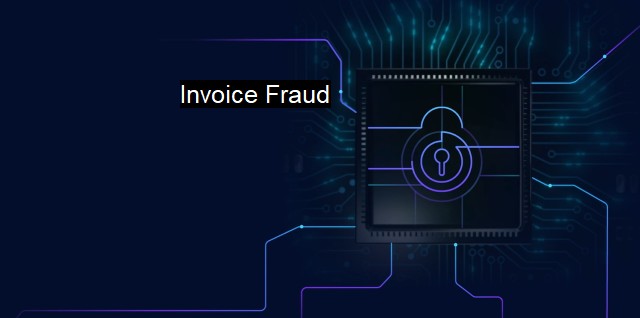What is Invoice Fraud?
Invoice Fraud: Recognizing and Preventing Cyber Threats Targeting Businesses
Invoice fraud constitutes one of the many deceptive actions cybercriminals engage in to swindle victims of funds or sensitive information. Cybersecurity plays an impeccable role in warding off these attacks while antivirus programs augment defense mechanisms by detecting, quarantining, and eradicating malicious software related to such fraudulent acts.By definition, invoice fraud consists of instances when an individual or organization manipulates invoices in an attempt to trick another person or entity into making unwarranted payments. The fraudster usually poses as a legitimate supplier and issues a counterfeit invoice reflecting non-existent transactions or significantly exaggerated amounts. This unscrupulous act can be perpetrated through numerous techniques such as business email compromise (BEC), fake invoices, double billing, supplier swindling, or internal employee fraud.
BEC is particularly prolific in the cybercrime scene. Here, fraudsters impersonate senior executives or key decision-makers within an organization. They exploit this assumed authority to request swift invoice payments from unsuspecting employees. This often creates a sense of urgency and compels employees to bypass normal invoice processing protocols.
In the fake invoice scam, fraudsters carefully study their targets, understanding their habitual supplier dealings, and fabricate fraudulent but convincing invoices. These invoices are sent bearing seemingly legitimate details like logos and contracts that bear a close resemblance to genuine invoices, making it harder for recipients to recognize the deceit.
Double billing is another variant where fraudsters again play on mimicry by sending two invoices for the same service or product. The first invoice acts as a teaser, a relatively small amount designed to test the victim's alertness, followed by the second. The true intent is to get the victim to pay the legitimate invoice and the fraudulent one.
Supplier swindle occurs when fraudsters masquerade as established suppliers. They inform clients of updated banking information under the premise of a ‘new account,' coaxing them to redirect their payments.
In some cases, employees internal to an organization exploit their position, issuing fraudulent invoices for personal gain. They might create phantom suppliers or alter genuine invoice details before directing reimbursements to their personal accounts.
These multipronged attacks gain momentum largely because of unsuspecting and uninformed victims. A cybersecurity culture is thus critical in creating an atmosphere of alertness. Cybersecurity, as a discipline, helps protect networks, systems, and data from digital attacks. Emphasizing cybersecurity enables organizations and individuals to understand, recognize, and appreciate the repercussions of invoice fraud.
Training sessions, workshops, and periodical knowledge updates can help organizations educate their workforce about the many faces of cyber fraud and the associated security measures. Employees should be educated about policies including never sharing sensitive information via email, careful scrutiny of supplier details, double-checking seemingly innocuous changes like updated banking details, rechecking unusually high invoice amounts, or unexpected invoice repetition with suppliers directly.
Sophisticated security technologies should be implemented, firewalls bolstered, and robust encryption protocols indulged in to thwart potential invoice fraud attempts. Antivirus software plays a critical defense role by providing necessary alerts about malicious usage, suspicious rhythmic patterns or non-characteristic actions within the network.
Antivirus programs can effectively guard against malware like spyware or ransomware that fraudsters may use to infiltrate and pilfer sensitive details. The antivirus scans, neutralizes, and eliminates these threatening features, safeguarding data and transaction credibility.
Therefore, invoice fraud stands as a severe threat that is unfortunately empowered by unsuspecting victims. Strengthening cybersecurity awareness and investing in vigorous antivirus measures are imperative to creating a secure scaffolding that limits the onslaught of such fraudulent practices.

Invoice Fraud FAQs
What is invoice fraud?
Invoice fraud is a type of scam where attackers use fake or altered invoices to trick individuals or businesses into paying for goods or services they did not receive.How do cybercriminals conduct invoice fraud?
Cybercriminals use various methods to conduct invoice fraud, including email phishing, social engineering, and malware attacks. They may also use spoofed email addresses or create fake websites to make their invoices appear legitimate.What are some red flags to look for to identify invoice fraud?
Some red flags to look for when identifying invoice fraud include unfamiliar account numbers, invoice variations, an increase in the number of invoices received, and email addresses or phone numbers that are different than those previously used by the vendor.How can I protect myself or my business from invoice fraud?
To protect yourself or your business, it's important to be cautious when opening emails or downloading attachments from unfamiliar sources. You can also implement two-factor authentication, use antivirus software, and verify invoices by contacting the vendor directly via a known phone number or email address.| | A | | | B | | | C | | | D | | | E | | | F | | | G | | | H | | | I | | | J | | | K | | | L | | | M | |
| | N | | | O | | | P | | | Q | | | R | | | S | | | T | | | U | | | V | | | W | | | X | | | Y | | | Z | |
| | 1 | | | 2 | | | 3 | | | 4 | | | 7 | | | 8 | | |||||||